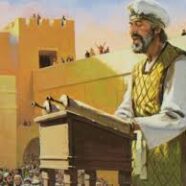Americans, Brains and Ezra the Scribe
The Monroe Doctrine
This was what would now likely be termed an isolationist policy adopted by the Americans which stated that the Europeans had no business interfering in any way on the continents of the Americas – that is, Central and South America. The Americans supported independence movements in Chile, Argentina, Colombia and Mexico. They were the first to recognise Brazilian independence in May, 1824.
The British approached the Americans in 1823 to make a joint declaration to the effect that ex-Spanish colonies in the Americas were irrecoverable to Spain. In the end, the Americans decided not to make a joint statement but a separate one stating, in a word, “Hands off the Americas, Europe!”
(Source: The Treasury of the Encyclopædia Britannica, Viking Penguin, 1992
Brain Surgery
Henry Marsh, in his book, “Do no Harm: Stories of Life, Death and Brain Surgery,” admits to causing harm to a patient in an attempt to help her. His efforts to remove a tumour from her brain resulted in paralysis. He writes that “[He] had been insufficiently fearful.” He wouldn’t feel at peace again until the next successful operation had been completed.
(Source: Marsh, Henry, Do no Harm: Stories of Life, Death and Brain Surgery, Wiedenfeld & Nicolson, 2014
Ezra, the Scribe
After the Judeans were banished sometime around the 6th century B.C.E. they were allowed to settle in Nippur, near Babyon. One of their tribe was Ezra, a scribe. He and some followers were tasked with going to Jerusalem by Artaxerxes, king of Persia. They had his protection but his interest wasn’t altruistic: he wanted them to establish an imperial outpost.
Ezra was horrified by what he found in Judea: it was nearly deserted, and those who did live there were ignorant farmers who’d shed their tribes traditional love for scripture and learning. Jerusalem was just rubble. In the absence of the Jewish Temple, Ezra made sacred the foundational texts of the tribe thereby being the first to make a test itself an object of worship. The Temple wasn’t necessary now: the Jews had their scriptures. However, Ezra disdained the Judeans’ practice of miscegenation and ordered that they give up their foreign wives and children.
(Source: Puchner, Martin, The Written World: How Literature Shapes History, Granta, 2017)
Roosevelt on the eve of war
Franklin Delano Roosevelt had a problem. Americans had no stomach for sending American troops to fight in Europe but they did want Hitler defeated. Roosevelt had already got involved through the Lend/Lease agreement which served to supply Britain with arms and materiel. Now, he and his advisers realised that, despite Stalin’s less-than-glorious rule of Russia, they’d have to help the Russians defeat Hitler if they wanted a return on their investment in Britain. If Russia lost the war, Britain probably would too.
In the end the difficult decision was made for Roosevelt when Japan bombed Pearl Harbour in December, 1941, and when Hitler declared war on the United States a few days later.
(Source: Kershaw, Ian, Fateful Choices: Ten Decisions that Changed the World: 1940-1941, Allen Lane, 2007)






